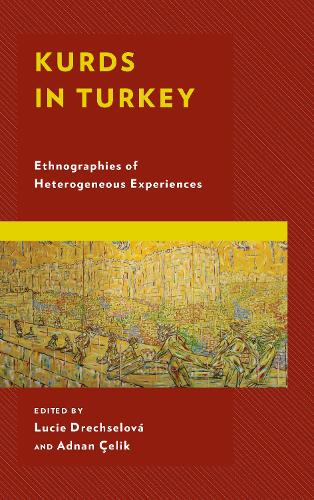
Kurds in Turkey: Ethnographies of Heterogeneous Experiences
(Paperback)
Publishing Details
Kurds in Turkey: Ethnographies of Heterogeneous Experiences
By (Author) Lucie Drechselov
Edited by Adnan elik
Contributions by Ayhan Isik
Contributions by Isabel Kser
Contributions by Minoo Koefoed
Contributions by Yesim Yaprak Yildiz
Contributions by Davut Yesilmen
Contributions by Suna Yilmaz
Bloomsbury Publishing PLC
Lexington Books
15th March 2021
United States
Classifications
Professional and Scholarly
Non Fiction
Ethnic studies / Ethnicity
956.100491597
Physical Properties
Paperback
226
Width 154mm, Height 220mm, Spine 13mm
363g
Description
Kurds in Turkey: Ethnographies of Heterogeneous Experiences is the newest contribution to the bourgeoning Kurdish Studies literature. The edited volume unites eight junior scholars who offer ethnographic studies based on their latest research. The chapters are clustered around four main headings: womens participation, paramilitary, space, and infrapolitics of resistance. Each heading assembles two chapters which are in dialog with each other and offer complementary and at times competing perspectives. All four headings correspond to the emerging domains of research in Kurdish studies. Authors share a micro-level focus and take extensive field work as the basis of their argument. In the wake of massive urban destructions and renewed warfare in the Kurdish region in Turkey, this volume also stakes a stance against the memoricide of the Kurdish municipal experience and cultural production.
Reviews
This edited volume of eight essays, extracted largely from dissertations completed at Turkish and European universities, is an attempt to internationalize the non-military challenges Kurdish nationalist movements in Turkey face because the civil components of the resistances ideology of democratic confederalism and democratic autonomy are largely left untouched. With references to similar challenges in Iraq, Syria, and Iran, the book is organized around four main issues: womens participation, paramilitary groups, space, and the infrapolitics of resistance, through which the authors examine often-ignored means of civil resistance, including the cross-border smuggling of clothes, guns, and heroin between Kurds in Turkey and Kurds in Syria, Iraq, and Iran. The strongest evidence that civil tactics of resistance are gaining traction in the movement's 40-year conflict with the Turkish state is the burgeoning production of novels written in the Kurmanji dialect of Kurdish, spoken in Turkey and Syria. The contributors argue that this development aids not only national liberation but also the liberation of minds and language from the destructive forces of colonial powers.
Summing Up: Recommended. General readers and graduate students.
This volume presents in-depth investigations in a variety of unexplored fields and audaciously renews our reading of the Northern Kurdistan. The issues it deals with such as women participation to legal and armed struggles, para-militarization of state coercion and state apparatus, micro-level resistances and trans-frontier forms of resistance are crucial to understand the very making of the Kurdish politics in Turkey. -- Hamit Bozarslan, cole des Hautes tudes en Sciences Sociales
Due to its scientific exigences, its remarkable inner coherence and to its stimulant richness of angles and sources, Kurds in Turkey: Ethnographics of Heterogeneous Experiences is a highly original contribution to the Kurdish studies (and beyond). Fueled by deep and always reflexively conducted field-researches, by a striking command of languages at play and by abundant first-hand materials, this groundbreaking book opens new perspectives on the topic, by entering in deep into till now neglected matters. Going far beyond the state-centered and macro-identities centered narratives generally available when ordinary dealing with Kurdish issue, Kurds in Turkey provides vivifying, courageous and full of promise counter-narrative tracks, grounded on solid social-sciences methodologies and theories. -- Jean-Franois Prouse, former head of the French Institute for Anatolian Studies (IFEA)
What distinguishes this excellent book on the Kurds in Turkey is its emphasis on what happens on the ground, on the everyday experiences of the Kurds, ranging from the activities of Kurdish women guerrillas to the adverse impact of Turkish paramilitary groups to Kurds smuggling for economic survival. A must read for all those interested in understanding what it means to be a Kurd in contemporary Turkey. -- Fatma Muge Gocek, University of Michigan, Ann Arbor
Author Bio
Lucie Drechselov is postdoctoral fellow at the Czech Academy of Sciences
Adnan elik is postdoctoral fellow at Sciences Po Lille
